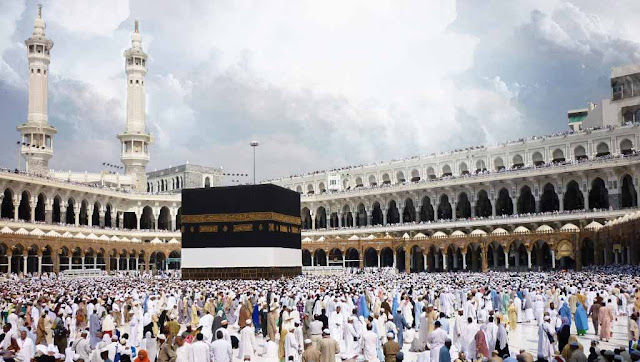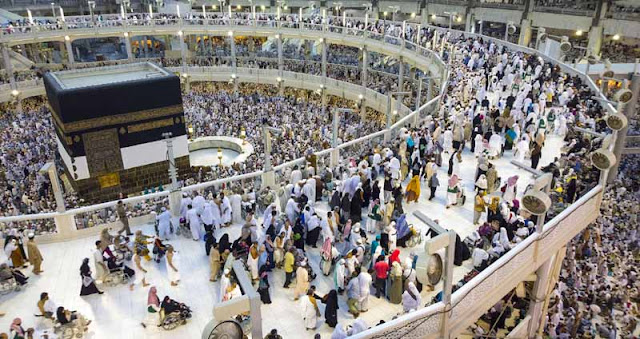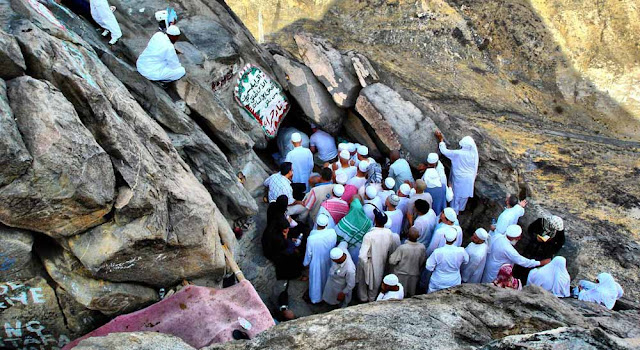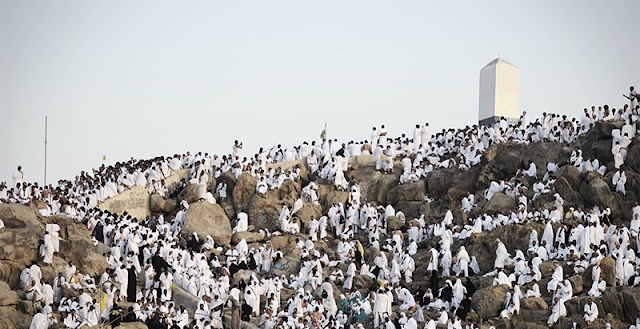Rulings for Women on Hajj and ‘Umrah
It is a communal obligation upon the whole Ummah to perform Hajj annually to the
Sacred House of Allaah The Almighty. Hajj is obligatory once in the lifetime of every Muslim who meets the conditions of Hajj. The extra times will be considered voluntary
Hajj. Hajj is one of the pillars of Islam and the share of woman in Jihaad. ‘Aa’ishah may Allaah be pleased with her narrated that she once asked the Prophet, sallallaahu `alayhi wa sallam ( may Allaah exalt his mention ), "Should Muslim women participate in Jihaad?" The Prophet, sallallaahu `alayhi wa sallam ( may Allaah exalt his mention ) answered her:"Yes, but their Jihaad is free of fighting; it is performing Hajj and ‘
Umrah.” [Ahmad and Ibn Maajah]
The general conditions of Hajj that apply to the man and woman are: Islam, sanity, freedom, puberty and financial ability.
1-
Mahram (non-marriageable male): it is a condition for the woman who wants to perform Hajj to have a Mahram accompanying her who may be her husband or whoever is not allowed to marry her forever either by blood relation such as her father, son, brother or by a permissible reason such as brother from a suckling relation, her stepfather or stepson.
Ibn ‘Abbaas may Allaah be pleased with him said that he heard the Prophet, sallallaahu `alayhi wa sallam ( may Allaah exalt his mention ), delivering a Khutbah saying: “No man should be in seclusion with a woman except in the presence of a Mahram and no woman should travel except with a Mahram."A man stood up and said, ‘O Messenger of Allaah, my wife has set out for Hajj, and I have signed up for such-and-such military campaign.’ The Prophet, sallallaahu `alayhi wa sallam ( may Allaah exalt his mention ), said: ‘Go and perform Hajj with your wife.’” [Al-Bukhaari and Muslim]
Ibn ‘Umar may Allaah be pleased with him narrated that the Prophet, sallallaahu `alayhi wa sallam ( may Allaah exalt his mention ), said: “A woman is not allowed to travel for three days without the company of a Mahram.” [Al-Bukhaari and Muslim]
There are many Hadeeths that forbid the woman from travelling for Hajj or any other purpose without a Mahram. The woman is weak and prone to face a lot of hardships and troubles that only men can overcome. Moreover, wicked and immoral men look at women as prey, so there must be a Mahram accompanying the woman to protect and guard her. The Mahram who accompanies the woman has to be sane, adult and Muslim. If she cannot find a Mahram, she has to send someone to perform Hajj on her behalf.
2-If the woman is going to perform voluntary
Hajj, she needs to have the permission of her husband because her travel for Hajj deprives him of enjoying his right. So, he has the right not to allow her to go for voluntary Hajj.
3-It is permissible for the woman to perform Hajj or ‘
Umrah on behalf of a man as well as another woman according to the consensus of scholars.
4-If the woman on her way to Hajj has her monthly period or postpartum bleeding, she should continue her way and fulfill her Hajj like the ritually pure women. However, she should not circumambulate the Ka‘bah. If she has menses or postpartum bleeding when entering the state of Ihraam, she is allowed to enter Ihraam because it does not require purification.
5-Upon entering Ihraam, women are permitted like men to make Ghusl (ritual bath) and clean themselves by cutting hair that needs shaving and clipping nails. There is no harm if the woman applies non-fragrant perfumes, for ‘Aa’ishah may Allaah be pleased with her said, “We pasted our foreheads with Musk at the time of assuming Ihraam. When one of us perspired, it (the perfume) came down on her face. The Prophet sallallaahu `alayhi wa sallam ( may Allaah exalt his mention ) saw this, and did not forbid it.” [Abu Daawood]
6-When making the intention of entering the state of Ihraam, the woman should take off her Niqaab (face veil) or Burqu’ if she was wearing any before Ihraam. The Prophet, sallallaahu `alayhi wa sallam ( may Allaah exalt his mention ), said: “The woman in the state of Ihraam is not allowed to wear Niqaab.” [Al-Bukhaari] The woman should cover her face with anything other than Niqaab by putting her Khimaar or garment over her face when non-Mahram (marriageable) men look at her. She should also cover her hands with anything other than gloves by putting a garment or cloth above them. The woman’s face and hands are ‘Awrah that must be covered before non-Mahram men either in case of Ihraam or other cases.
7-During Ihraam, it is permissible for the woman to be dressed in any kind of clothing that has no adornments, and does not look like men's clothes. Such clothes should not be tight to outline the shape of her body, or transparent that reveal whatever is beneath them, or short that unveil the feet or hands. The clothes should be loose and thick. Scholars unanimously agree that the woman in the state of Ihraam is allowed to wear Qamees, Dir‘, Sirwaal, Khimaar, and leather socks and she does not have to wear a certain color. She is allowed to wear any color she likes.
8-It is recommended for the woman to raise her voice with Talbiyah after Ihraam only to the extent that she can hear herself. It is disliked for her to raise her voice to a higher level in order to avoid Fitnah. By the same token, it is not recommended for her to pronounce the Athaan or Iqaamah. In addition, whenever she wants to draws the attention of the Imaam to something in prayer, it is recommended for her to clap, not to say Subhaan Allaah loudly like men.
9-The woman has to be completely covered, lower her voice, lower her gaze, and not to crowd with men especially at the Black Stone, and the Yemenite Corner. It is unlawful to crowd together with men because this is Fitnah. Moreover, it is Sunnah to be closer to the Ka‘bah and to kiss the Black Stone in case that is possible. She should not commit an unlawful act in order to fulfill a Sunnah (Prophetic tradition). The Sunnah for the woman is to point to the Black Stone from afar when she is facing it.
10- All the Tawaaf (circumambulation) and Sa‘y of the woman is done while walking. Scholars unanimously agree that women should not walk quickly in Tawaaf or between As-
Safa and Al-Marwah and they do not have to make Idhtibaa‘ (uncovering the right shoulder).
11-The menstruating woman is permitted to do all the rituals of Hajj including Ihraam, staying at ‘Arafah, spending the night in Muzdalifah, throwing the pebbles, and so on, with the exception of making Tawaaf until she becomes purified. The Prophet, sallallaahu `alayhi wa sallam ( may Allaah exalt his mention ), said to ‘Aa’ishah may Allaah be pleased with her: “Do what the pilgrim has to do but do not make Tawaaf until you become purified.”The menstruating woman should not make Sa‘y between As-Safa and Al-Marwah because Sa‘y is not valid without performing the Tawaaf of the Hajj or ‘Umrah because the Prophet, sallallaahu `alayhi wa sallam ( may Allaah exalt his mention ), did not make Sa‘y except after Tawaaf. The majority of scholars said that Sa‘y is not valid if the pilgrim made Sa‘y before Tawaaf.
If the woman has her menses after finishing Tawaaf, then, it is permissible to perform Sa‘y because purification is not a condition for Sa‘y.
12-It is permissible for women to proceed from Muzdalifah to Mina with the weak people after the setting of the moon and to throw Jamrat Al-‘Aqabah upon arriving at Mina out of fear of overcrowding.
13-The woman should trim her hair the length of a fingertip from the end of the hair after Hajj and ‘Umrah. It is impermissible for the woman to shave her hair.
14-If the menstruating woman throws Jamrat Al-‘Aqabah and trims her hair, then, her Ihraam is ended and she is allowed to do whatever she was not permitted to do during Ihraam except having intimate relations with her husband. She is permitted to have such relations after Tawaaf Al-Ifaadhah. If she has sexual relations with her husband before performing Tawaaf Al-Ifaadhah, then, she has to pay expiation: slaughtering a sheep in Makkah and distributing its meat among the poor of the Sacred City.
15-If the woman menstruates after Tawaaf Al-Ifaadhah, then, it is permissible for her to leave for her home whenever she likes and she does not have to perform the Farewell Tawaaf. ‘Aa’ishah may Allaah be pleased with her narrated that Safiyyah bint Huyayy may Allaah be pleased with her started menstruating after Tawaaf Al-Ifaadhah and I mentioned this to the Prophet, sallallaahu `alayhi wa sallam ( may Allaah exalt his mention ). He said: “‘Will she keep us from leaving?’I said, ‘O Messenger of Allaah, she performed Tawaaf Al-Ifaadhah and then she had her menses.’ He said: ‘Then, let her leave.’” [Al-Bukhaari and Muslim]
Ibn ‘Abbaas may Allaah be pleased with him said, “The Prophet sallallaahu `alayhi wa sallam ( may Allaah exalt his mention ) commanded the pilgrims that the last thing they should do in Makkah is to circumambulate Al-Bayt (the Ka‘bah), but he exempted the menstruating woman and the one who has postpartum bleeding.”
Article by: www.islamweb.net














